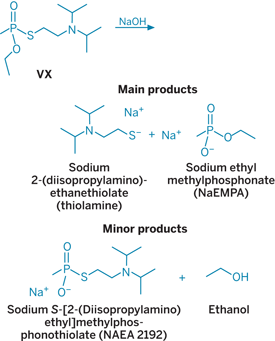Advertisement
Grab your lab coat. Let's get started
Welcome!
Welcome!
Create an account below to get 6 C&EN articles per month, receive newsletters and more - all free.
It seems this is your first time logging in online. Please enter the following information to continue.
As an ACS member you automatically get access to this site. All we need is few more details to create your reading experience.
Not you? Sign in with a different account.
Not you? Sign in with a different account.
ERROR 1
ERROR 1
ERROR 2
ERROR 2
ERROR 2
ERROR 2
ERROR 2
Password and Confirm password must match.
If you have an ACS member number, please enter it here so we can link this account to your membership. (optional)
ERROR 2
ACS values your privacy. By submitting your information, you are gaining access to C&EN and subscribing to our weekly newsletter. We use the information you provide to make your reading experience better, and we will never sell your data to third party members.
Environment
DuPont Won't Treat Army's VX Hydrolysate
Company says getting approval for operating permit would be 'lengthy and arduous'
by Lois R. Ember
January 8, 2007

DuPont announced on Jan. 5 that it is backing out of an Army proposal to ship the caustic product of VX nerve agent neutralization from an Indiana facility to a DuPont facility in New Jersey for secondary treatment and ultimate disposal in the Delaware River.
Several years earlier, an Ohio waste treatment company, Permafix, also refused to treat the Army's VX wastewater. Both Permafix and DuPont backed away when it became apparent that stiff environmental, community, and political opposition made obtaining a state discharge operating permit unlikely.
"It has become increasingly clear to us that the approval process will be lengthy and arduous, even with the supportive conclusions reached by the Centers for Disease Control and the U.S. Environmental Protection Agency in their independent reviews," said Nicholas C. Fanandakis, vice president and general manager of DuPont Chemical Solutions Enterprise.
Those federal agencies concluded that the Army's plan posed no undue risks to the environment or public health. Still, Fanandakis said, "we believe it is in the best interests of New Jersey and DuPont not to proceed."
Since 2004, the Army has planned to neutralize its nerve agent stockpile at Newport, Ind., on-site and transport the resulting wastewater, dubbed hydrolysate, to DuPont's Chamber Works facility in Deepwater, N.J., for biological secondary treatment. New Jersey lawmakers have strongly opposed the Army's plan, and more than 50 organizations, townships, and cities have passed resolutions against it.
On Dec. 20, 2006, the Delaware Riverkeeper and six other groups, including the Chemical Weapons Working Group, filed suit against the Army, claiming that shipment of the hydrolysate violates a law banning interstate transportation of chemical weapons. CWWG's Craig E. Williams says it makes no "sense from the standpoints of chemical security, environmental justice, or worker safety to ship chemical agent wastes across state lines when the same waste can be safely treated at its source."
In support of its plan, the Army has argued that shipping the hydrolysate off-site for secondary treatment would lower costs and speed up U.S. compliance with the chemical weapons treaty. The treaty mandates complete destruction of the U.S. chemical arsenal by the extended deadline of 2012. The Government Accountability Office is studying whether off-site treatment is more cost-effective than on-site treatment, as the Army contends. GAO's report is scheduled to be released on Jan. 26, says spokeswoman Laura A. Kopelson.
The Army is now back to square one and is again "reviewing all options available to address this ongoing issue," says spokesman Gregory Mahall. He says options include on-site secondary treatment of the hydrolysate.
To date, the Newport facility has neutralized about 36% of the original stockpile and is storing the resulting hydrolysate on-site. Mahall says the Army will continue "to treat, to neutralize VX nerve agent. Newport has sufficient capacity to store" all hydrolysate resulting from neutralization of the Newport stockpile.
However, Mahall stresses, the Organization for the Prohibition of Chemical Weapons, which implements the treaty, "does not give the U.S. credit for complete destruction of the nerve agent until after secondary treatment."




Join the conversation
Contact the reporter
Submit a Letter to the Editor for publication
Engage with us on Twitter